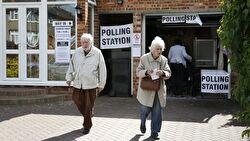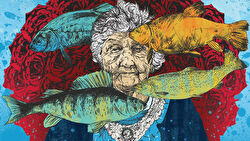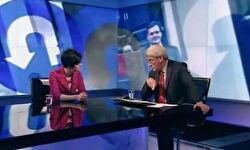
It is the hottest day of the year and my guest has been delivered to the restaurant by a perspiring middle-aged man whom I recognise as the leader of the Scottish National party’s band of MPs in the House of Commons. Less than half his age, shorter and cooler, she is dressed in something of a uniform: dark blue trousers and jacket and a light blue shirt, her fair hair pulled tight to her head. She’s worn much the same thing in every photo of her I’ve seen in the press.
She will shortly be making her maiden speech — since viewed online more than 10m times — but Mhairi Black is already a political sensation. The newly elected MP for Paisley and Renfrewshire South pulled off the most dramatic of the SNP’s many victories in the May general election when she defenestrated Douglas Alexander. Ed Miliband’s chief election strategist, Alexander had been sitting on a majority of 16,000, looking forward to being foreign secretary in the next Labour government. Suddenly he found himself dethroned.
Before the election many had worried about the disengagement of young people from politics. Black gave the lie to that belief.
She is only 20, and immediately became the youngest MP in the House of Commons, earning the nickname “the baby of the House”.
There had been a bit of toing and froing about where we might eat since — as she put it in an email — the only restaurant she had seen in London was McDonald’s. But it turns out that the tabloid coverage depicting her as a cartoon Scot existing on fast food, chips and deep-fried Mars bars is as benign as you’d expect a portrayal of the Antichrist to be: she enjoys a wide variety of food, and likes cooking. “I asked for a pasta-maker for my 15th birthday. And I used it.”
She picked the Cinnamon Club from my list of suggestions, an upmarket Indian place in the old Westminster public library, close enough for her to be able to scurry back to the House of Commons if she needed to vote. As chance would have it, the restaurant is part of the FT Weekend Summer Menus promotion, which simplified our choice of food, offering a three-course meal for £45. “I’ll have the whole shebang, if that’s all right,” she says. I join her, and fish my recording machine out of my pocket, bought that morning from Argos. It turns out that I have, unfortunately, chucked the instructions in the bin, along with the packaging.
Fortunately, as well as being the youngest MP since the Great Reform Act of 1832, Black is also a dab hand with irritating technology. I can’t make my recording machine work but she has used an identical device as a student. I am already feeling a little like an elderly uncle taking his niece out for a square meal. Now there is a serious danger of the whole lunch degenerating into absurdity. Having fixed the recording device, maybe she’ll start asking herself questions next.
I try to get on to the front foot by asking her how on earth it had all happened. “I’m still a bit stunned,” she says. Her home town of Paisley sits solidly in that less than beautiful strip of lowland Scotland where the textile mills closed long ago and one grandly titled promise of regeneration after another has fallen flat. It’s the sort of town that once had the reputation for being a place where the Labour party could stick a red rosette on the studded collar of a child-eating bull terrier and see it elected to parliament. A procession of clapped-out trade union officials and former council leaders — “low-flying jimmies”, as they were known in parliament — were regularly dispatched to Westminster, where they seemed to spend lives of harmless inactivity drinking subsidised alcohol in House of Commons bars until instructed to wobble out to vote in parliament as the party whips instructed.
Yet the new MP for Paisley is not only young and female. She also represents the SNP. Black is walking proof that in contemporary politics all bets are off.
In this year’s general election Labour was reduced to one seat out of the 59 in Scotland. The SNP took 56 of the others.
Not so long ago, the Labour machine might have counted on the votes of families like the Blacks — Catholic, politically engaged public-sector employees. Her parents were teachers. “We were expected to watch the news — and to comment on it,” she says. The new MP’s elder brother is a railway conductor. Some of her friends are on the dole. The SNP were known in the family as “the Scottish nose-pickers”.
But the conversion of the Black family, which took place when Mhairi was a teenager, was perhaps typical of what happened across the country. “My dad and I used to argue for hours at the dinner table,” she says. “I just couldn’t understand how anyone could continue to believe in the Union when things weren’t really changing at all.”
…
When the waiter arrives with the first course — she’s having spice-encrusted Kentish lamb, I’m having Bombay-style vegetables — Black looks at the food, says, “Smashing,” and makes a point of thanking him generously.
She began to go “door-chapping” (canvassing) for the nationalists long before last September’s referendum on independence, and found that vast numbers of voters had come to the same conclusion as she had. There were some holdouts, of course. “It took a long time to persuade my Auntie Jane, until I took her to a Labour for Independence meeting, and next morning she posted on Facebook that she was voting yes! I read her post in the library at university and I had to run outside because I was so excited, and you can’t make a noise in the library.”
Anyone who has spent any time with London parliamentarians becomes wearily familiar with their noisy omniscience.
In that sense, Black is not a parliamentarian, for the most striking thing about her is not confidence but enthusiasm. She’s young and committed, and it takes no effort at all to imagine her running out of the university library and punching the air.
Yet the nationalists lost the referendum on Scottish independence after almost all the London party leaders scurried north in the last days of the campaign to spread the heebie-jeebies among voters. It worked. “It was horrible and soul-destroying, so it was. I don’t think I slept at all that night [of the referendum result]. It was horrible the next day, too. Then a couple of days later I thought, ‘I’ve not worked for two years just to see it all come to nothing’.” She went back to door-chapping.
So what explains the SNP’s triumph, only a few months later, in the general election? It wasn’t an upsurge of nationalist feeling. “The SNP destroyed Labour because we were anti-austerity, whereas their message was almost the same as in the Better Together campaign.” (“Better for whom?” I have always wondered.)
With the arrival of the main course — we are both having chicken with mace and cardamom, with a mint chilli korma sauce — she again thanks the waiter politely and I wonder whether this sort of comfortable, expensive food is something she feels Labour MPs from lowland Scotland just got too used to. “They just seemed to be blagging it for years,” she says. For the voters, rejection of self-determination was not the same as embracing the way the Union worked in Scotland. “Supporting Labour might have made sense at the start of the welfare state but it didn’t do so any longer. By the 21st century, Labour had become intellectually bankrupt,” she says.
I suspect she intends “intellectual bankruptcy” to include moral and spiritual impoverishment, too. New Labour was always an English project, designed to make the party safe for the middle class. If anyone killed the Labour party in Scotland, I suggest, it was Tony Blair and Peter Mandelson. “New Labour meant so little,” she says.
The waiter returns with another bottle of overpriced mineral water — a restaurant racket I am too feeble to refuse. “You know,” says Black mischievously, “in Scotland we drink water out of the tap.”
When at home in her constituency she still lives with her parents, surrounded by “schemes” (council housing estates), the indications of deprivation — unemployment, a wrecked town centre, substance abuse — all too easy to find. It is not that Scotland failed Labour but that too many people had come to believe Labour had failed Scotland. Putting the question of independence on to the agenda had the effect of inciting the country, she says, to have “a serious political conversation with itself: if the constitutional basis of Scotland was up for grabs, why not everything else?”
She recalls a discussion with her dad in the pub before going to a football match. “He said there’s too many people just think politics is for other people, instead of getting stuck in.” It was more than enough encouragement. A question I ask about where she acquired the self-confidence to believe — unlike 99.9 per cent of the population — that she could stand for parliament simply seems not to register with her.
…
Politicians are not normal people — most of us can go through life without wanting to frame laws — but Black was lucky that her own growing-up ran in sync with the wholesale reassessment taking place within Scottish politics. There is a striking contrast between attitudes north and south of the border, where great numbers of people simply want government to leave them alone.
Still, her enthusiasm seems undimmed. She describes how, “The other night down the pub, there was two plumbers, still in their overalls, and they were having such a fierce argument, I thought to myself, ‘This is going to kick off any moment.’ And then I listened in. And do you know what they were arguing about? Full fiscal autonomy [a proposed arrangement in which the country would stay within the Union while controlling its own financial affairs]. And I thought, ‘I love this!’”
Being a fan of Partick Thistle, an unglamorous football club in the Scottish Premiership, imbues a certain stoicism — “Partick are the most frustrating team in the world. They could play Barcelona, be one-nil up after 89 minutes and still lose two-one” — but she says she had no special confidence about the outcome of the election.
So on the night of the count she stayed at home, playing guitar and watching The Big Bang Theory. She wrote two speeches, one for victory and one for defeat. But she only rehearsed the losing speech.
Her father was her election agent; when he called to arrange for her to come to the declaration of the result, she explains, he kept saying breathily, “It’s close, Mhairi, it’s so close.”
Inside the local leisure centre, the returning officer took the candidates and their agents behind a curtain to brief them about the impending declaration. Suddenly, her father turned to her and said, “ ‘Mhairi, I’ve been lying to you all night. You’ve been winning since they counted the first box. We didn’t tell you because we didn’t want you to work yourself up.’ It was a bombshell. I was the last one to know.”
The young woman who had nursed childhood dreams of becoming an astronaut, a farmer or a judge was suddenly an MP. Parliament is increasingly full of dull people who have done nothing with their lives but work their way up the greasy pole, striking an attitude as a student, then toiling away as party minnows, until finally getting the chance to try for a winnable seat. The accusation cannot be levelled at Black: she hadn’t even finished her undergraduate course in politics and public policy at the University of Glasgow at the time of the election (she has since graduated with a first-class degree), and she had been thinking about training to become a teacher, like her parents.
The pudding arrives: a lemon and ginger crème brûlée for me, a chocolate and pecan pudding with ice-cream for her. Both disappear fast.
Her enemies have tried to discredit her by unearthing embarrassing tweets from her school days, which she had tried to take down, such as “maths is shite” and “Smirnoff Ice is the drink of gods”. The tweets may not have been wise but they’re hardly hanging offences, and she wasn’t trying to become an MP at the time. “The only people who mention my age are English journalists,” she says. “Everyone else is just interested in getting the job done.” But in this case her age is a help — we all do silly things when we’re young.
Anthony Trollope, I find, is the usual author politicians mention when attempting to demonstrate that they have some cerebral pleasures. Black’s favourite, however, is someone called Mitch Albom, author of The Five People You Meet in Heaven (2003).
Though born the year that Oasis’s Definitely Maybe was released, she has a positively geriatric taste in music — Motown, U2, The Beatles, the Kinks, the Stone Roses. I mention that this, surely, is more her dad’s kind of music. “So it is, but I love it,” she says.
Our set lunch comes with a glass of Laurent-Perrier, which she was too polite to refuse, even though she doesn’t like champagne. Replacing it with a bottle of Kingfisher beer, I withstand the temptation to drink her champagne for her.
Now she finds herself in her first full-time job, on a salary of £67,000, along with plenty of expenses. Her final university work was completed in the House of Commons library, while various MPs had their afternoon snooze around her. She is about to take possession of “a wee one-bedroom flat”, she says, for her days in London. It is next-door to a pub and near a market — she finds Westminster oppressively isolated. “There’s nothing round here much but government buildings, but you hardly see anything anyway because you spend so much time in parliament.” She likes the area around her new home, she says, because when she got off the Tube she was the only person in a suit.
What does she think of the Palace of Westminster? “It’s stuffy and dusty,” she says. As for the £3bn to £6bn the taxpayers have been told may be needed to modernise the place, she is scathing — it’s “disgraceful”. How can that be reconciled with austerity? “Westminster can’t make up its mind whether it’s a museum or a functioning parliament. Of course, it’s an honour to be elected. But it’s just a building. Can you imagine a postman being attached to a particular pillar box?”
Black has been cheery, energetic and modest company throughout our lunch; her manners impeccable and her conversation frank. But those whom the gods wish to destroy they first make youthful sensations. Previous “babies of the house” — one thinks of the Irish nationalist Bernadette Devlin in the 1960s, and the late Charles Kennedy — have seldom realised their apparent potential. Others threw in the towel or became institutionalised dullards. Can she imagine spending the next 50 years in Westminster?
Though she is polite enough not to say so, this is a very stupid question indeed. She smiles. “I don’t imagine so. I hope we’ll be running our own affairs in Scotland. I’ve no doubt about it. Fundamentally, none of the SNP MPs really wants to be here.”
Jeremy Paxman is an FT contributing editor. Illustration by Patrick Morgan. Article courtesy of The Financial Times. Original found here.



